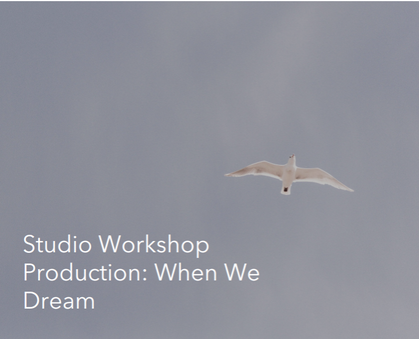- Folio No. 9
- About
- Feral Parrot : The Blog
- INTERVIEWS
- SUBMISSIONS
-
ISSUE ARCHIVE
- PRINT Chapbook No.6 Healing Arts
- Online Issue No.9
- Online Issue No.1 Fall 2016
- Online Issue No.2 Spring 2017
- ONLINE Issue No.3 Fall 2017
- PRINT Vol 72 No 2 Fall 2017
- PRINT Vol 73 No.1 Fall 2018
- ONLINE Issue No. 4 Fall 2018
- Online Issue No.5 Summer 2018
- FOLIO No.1 Fall 2018 VOTE
- ONLINE Issue No.6 Fall 2018 Fall Spirituality
- FOLIO 2 Fall 2019 Celebrating Dia De Los Muertos
- FOLIO No.3 -- Moon Moon Spring 2019
- FOLIO No.4 Celebrating New PCC Writers
- FOLIO No.5 City of Redemption
- FOLIO No.6 Spring 2020
- FOLIO No. 7 - Winter 2021 Into the Forest
- 2022 Handley Awards
- Inscape Alumni Board
- PRINT Chapbook No. 7 Healing Arts
- Blog
- Untitled
|
Written By: Perla Vogel Performed in November at Pasadena City College, "When We Dream" was a workshop devised and directed by Suzanne Hunt-Jenner and performed by PCC students through the Performing and Communication Arts Division. "When We Dream" was a moving and heart-inspiring play about undocumented youth incarcerated in the United States. Pasadena City College students read poems from unknown children and showed deep connection to the work and the words of the youth. The production was successful in giving these incarcerated immigrants a voice. The nation is facing many tough situations and this play was able to show citizens the many portraits of immigrants in our nation who still have a dream. During the play ten students took the roles of various youth voices who were currently incarcerated. These characters faced brutal and horrific situations on their journeys crossing the border. No one can really understand the plight they undergo just to be taken away into detention centers. Some of the undocumented youths die from starvation, dehydration, disease, and crime trying to cross the border. Some of the situations represented in the play shared how there are many undocumented youth who cross the border without any known relatives. Sometimes separated, the parents of these children are in America and the children are hoping to reunite with their loved ones. These undocumented youth go through so much strife and are at so much risk of crime, human trafficking, homelessness, and drug abuse. The audience thought about how we are all meant to break borders because when we break borders we are able to redefine ourselves as individuals and as a nation. Change is constant and we cannot deny the big shifts in our nation. The so-called "American Dream" has been the fuel of many new immigrants searching for a new life in this beautiful nation with its many opportunities. Having the ability to have a second chance after experiencing things like poverty, death, disability, violence, and drug wars makes living the American Dream a worthwhile desire. The kids took the time to write about their American dreams and what they wished for after their release. Most of them wanted to be reunited with their families and wished to study in the United States. Others shared how they wanted a better life -- something different from what people call “low life." The waiting and the not knowing part is a brutal torture for these kids. There is much controversy over this situation and nothing is being done to resolve it. These kids want to take care of their new country and meet others like themselves but in a better situation. Should these children really be paying the price for the irresponsible political system running the show? When have you ever seen any politicians put themselves in the shoes of these kids; could they survive the journey or the incarceration? Some of these kids don’t have parents but hope to find new mothers or family in the country. They have hopes for the future and for happiness. They use words of love and lines of poetry to hope for a better tomorrow so that they can live their dreams. The play shared how some children hid in car compartments, truck trailers, tunnels, deserts, crossing impossibly wide and wild rivers. Often, they underwent attacks from Cartel criminals who extorted them for money, threatened to enslave them, and to even kill them. These undocumented youth keep being told that life will get easier but it doesn’t, for them. However, it is their endless amount of hope and longing for a home that keeps them positive. They show their sense of humor, accompanied by the dark struggles they've endured; it is easier to laugh at pain. Imagine, a day or several months where something is missing like food, water, shelter, and warm clothing. Money is gone in a blink of an eye and the workers who are dreamers wish to learn and become a fixer of some kind. Still, there are some undocumented youth who will be deported. With the hope of lifting their spirits, the students sang, “Cielito Lindo” and directed it at those who are facing deportation. There are many immigrants who are undocumented not only from Mexico and Latin America, there are also some from Asia. One example, was a young girl from China; who was so worried about becoming an international student and about what will have more value to her life when she returns to China. Everyone has a hard time adjusting to a new country; she was no exception. But, she never gave up on her dream to become a Hollywood star. Starring in the play, she shares the same dreams as these children incarcerated at detention centers. Our whole country needs to be reborn so that we have a new beginning with the inclusion of all people on this sacred land. The discrimination and criminalization of immigrants has destroyed many families who are going to have to deal with separation and trauma over the loss of years they spend incarcerated. Can you hear the screams of these kids' ancestors calling and pleading for help? Everyone at the play performance heard these cries. Their courage moved them from their home country to find hope in a new country. We discover their love and amazing personality through the healing power their poetry produced which makes more of a difference than any political conference. We should be a country that builds bridges for children, not walls. We are a nation of immigrants and we all have a dream; each of us is no different than these incarcerated, undocumented youth. These youth are all lighthouses. They shine love and hope into our nation, and until we see it with our own eyes, we won't be able to see the true light of our humanity and own up to our service to it. Perla Vogel is currently studying graphic design at Pasadena City College.
Literature was very important to her starting at an early age. "My first book, Winnie the Pooh Bear was magical. I kept on reading over and over and took joy in being able to memorize the words by heart. I couldn't wait to read Winnie the Pooh to my friends who were also learning how to read. It is like they say each book is a friend waiting to be picked up and discovered". She is grateful to California for giving her a life long gift of education that they believe she would probably not have had access to if she had been in Mexico. "There is a great divide by poverty, violence, and sex discrimination for poor Mexican women and their children. One is lucky to even go to school and get an elementary education. I truly appreciate the opportunity to be in California to study the humanities art and language. I am very lucky to have the opportunities that so many undocumented children are currently being detained at immigration centers; dream about having one day." For Perla, her status as an undocumented student has been a life-long journey and she says she is still learning their position in society. "It may be a life long sentence; but there are many more undocumented immigrants that live their whole lives in the United States. Our existence of "staying in the shadows" in hiding and in silence is coming to an end. There are many of us, "illegal immigrants" who are warriors and heroes going to the front lines to help run the country by farming hands, cooking services, gardeners, maids, and other essential jobs that have a long historical tradition." "The United States has been my country as long as I have had any consciousness, however being born in Mexico has made me an outsider in both countries. I would like to reach out to all those who are in the same position and offer encouragement on their own journeys of finding identity, home, love, liberty and happiness. Long live our beautiful country, AMERICA!"
0 Comments
Leave a Reply. |
IMPORTANT NOTE:
PCC Inscape Magazine, housed at Pasadena City College, is following Coronavirus protocols. At this time our staff continues to read submissions and publish web content. Note:
Blog Posts reflect the opinions of the writer and not the opinions of Pasadena City College or Inscape Magazine Editorial Staff Members. Archives
December 2023
Categories
All
|




 RSS Feed
RSS Feed